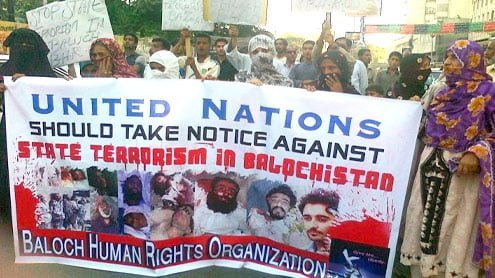In the middle of the night of October 28, 2017, I received a call from one of my colleagues in the Baloch Human Rights Organization (BHRO), a group working to highlight human rights abuses in Balochistan. It was unusual to receive a call from Pakistan directly on my mobile phone. Our colleagues there would usually use free calling apps to avoid being billed, or more precisely, being tracked by Pakistan’s intelligence agencies always eager to hunt down human rights campaigners from Balochistan.
“Nawaz jaan too has been taken away,” his voice shivered.
I was trying to figure out what did that mean when the voice echoed again. “Nawaz Atta has been abducted by secret agents in a raid on his house”. And the call disconnected.
Earlier the same night, I was discussing with Nawaz Atta about our research and documentation of the Internally Disappeared Persons caught in military operations across Balochistan. It was so difficult to believe that a full-of-life, laughing, chattering Nawaz Atta just vanished in the course of just few hours.
It’s been now four long months since the personnel of the Sindh Rangers and secret agencies whisked away Nawaz Atta Baloch, the Information Secretary of the BHRO, from his house in Karachi.
In follow-up raids the same night, they abducted eight more Baloch students in Karachi. They included Aftab Younis, Ulfat Altaf, Farhad Anwar, Sajjad Yar Jan, Rawat Taj, Muhammad Arif and Ilyas Faiz Muhammad.
Aftab is only eight years old and Ulfat only 11. Aftab was a grade five student at the Rising Star School and Ulfat a student at the Model School Gulshan-e-Hadeed. When the Rangers and secret agencies personnel came to take him away, her aunt, Farah Baloch, resisted. She was thrown from the third floor of the building, fracturing her backbone.
The Baloch Human Rights Organization organized protest demonstrations, held press conferences and its members established token hunger-strike camps in Karachi and Quetta, but all in vain. Not a single media outlet covered our protests nor did the forcible disappearance of children intrigued any journalist. Four months have passed, and there is still no trace of any of them.
As a human rights worker, I receive details of dozens of forcibly disappeared people almost on a daily basis. We document them and send their reports to media outlets and human rights watchdogs. Nothing happens. I feel as helpless as the family members of the victims. I wonder how worse the humanitarian situation in Balochistan shout get to get the alarm bells ringing for the media and human rights watchdogs.
In January 2014, three mass graves were recovered from Tootak in the Khuzdar district of Balochistan. Over 120 bodies were found buried in these mass graves. On the first day of digging, the bodies of Naseer Qalandarani and his brother were identified from their identity cards found in their shirt’s pockets. Naseer Qalandarani had been abducted in a military operation from Awaran three months before the recovery of the mass graves. However, the security forces besieged the site the very next day and no one is allowed to visit till this day.
A three-day military operation was conducted in Giyandari, Dera Bugti, where forces bombarded the village of Giyandari on September 12, 2016. In the bombardment, Pandi Bugti, his son and his daughter were killed while his wife Sammi Bugti was taken away by the security forces. She was pregnant at the time. After 50 days of illegal detention, she was thrown off a hovering helicopter.
We keep receiving gory details of such heart-wrenching stories from Balochistan on a regular basis. Just last year, our organization received 2,114 cases of enforced disappearances and 545 cases of extra-judicially murders.
Balochistan has been turned into a war zone for the last many years. Thousands of people have been forcibly disappeared and extra-judicially killed in the military’s counterinsurgency operations to curb a separatist armed struggle.
The government has abdicated itself from its responsibilities and is silent on the humanitarian crisis in Balochistan caused by the military’s highhandedness.
Pakistan is a member state of the United Nation and a ratifying party of the International Covenant on Economic, Social and Cultural Rights (ICESCR), and the United Nations Convention against Torture (UNCAT). Yet, it has disregarded the protocols of these conventions with impunity in Balochistan.
The silence of international human rights watchdogs will only encourage the security forces to commit more mass graves. They need to act now. What is at stake in Balochistan is humanity.
The writer is the General Secretary of the Baloch Human Rights Organization (BHRO). He is based in Germany.
Abdulla Abbas is executive director of Human Rights Council of Balochistan. He lives in exile in Germany and can be reached at @AbdullahAbbas



